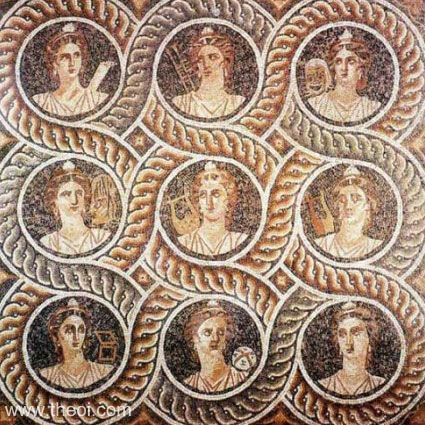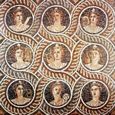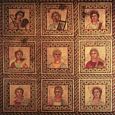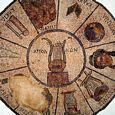OURANIA
Greek Name
Ουρανιη
Transliteration
Ouraniê
Latin Spelling
Urania
Translation
Heavenly One

OURANIA (Urania) was one of the nine Mousai (Muses), the goddesses of music, song and dance. In the Classical era, when the Mousai were assigned specific artistic and literary spheres, Ourania was named Muse of astronomy and astronomical writings. In this guise she was depicted pointing at a celestial globe with a rod.
FAMILY OF URANIA
PARENTS
[1.1] ZEUS & MNEMOSYNE (Hesiod Theogony 75, Apollodorus 1.13, Diodorus Siculus 4.7.1, Orphic Hymn 76)
OFFSPRING
[1.1] LINOS (Homerica Fragments 1, Folk Songs Frag 880)
[1.2] LINOS (by Amphimaros) (Pausanias 9.29.5, Suidas s.v. Linos)
[1.3] LINOS (by Apollon) (Hyginus Fabulae 161)
[1.4] LINOS (by Hermes) (Suidas s.v. Linos')
[2.1] HYMENAIOS (Pindar Dirges Frag 139, Nonnus Dionysiaca 24.77 & 34.67)
ENCYCLOPEDIA
URA′NIA (Ourania). One of the Muses, a daughter of Zeus by Mnemosyne. (Hes. Theog. 78 ; Ov. Fast. v. 55.) The ancient bard Linus is called her son by Apollo (Hygin. Fab. 161), and Hymenaeus also is said to have been a son of Urania. (Catull. lxi. 2.) She was regarded, as her name indicates, as the Muse of Astronomy, and was represented with a celestial globe to which she points with a little staff.
Source: Dictionary of Greek and Roman Biography and Mythology.
CLASSICAL LITERATURE QUOTES
Hesiod, Theogony 75 ff (trans. Evelyn-White) (Greek epic C8th or C7th B.C.) :
"The Mousai (Muses) sang who dwell on Olympos, nine daughters begotten by great Zeus, Kleio (Clio) and Euterpe, Thaleia (Thalia), Melpomene and Terpsikhore (Terpsichore), and Erato and Polymnia (Polyhymnia) and Ourania (Urania) and Kalliope (Calliope)."
Bacchylides, Fragment 3 (trans. Campbell, Vol. Greek Lyric IV) (C5th B.C.) :
"[The poet] has his share in the violet-haired Mousai (Muses).The light of man's excellence, however, does not diminish with his body; no, the Mousa (Muse) fosters it. And the sweet-voiced cock [the poet] of lyre-ruling Ourania (Urania)."
Bacchylides, Fragment 5 :
"You if any motal now alive will rightly assess the sweet gift [poetry] of the violet-crowned Mousai (Muses) sent for your adornment: rest your righteous mind in ease from its cares and come! turn your thoughts this way: with the help of the slim-waisted Kharites your guest-friend, the famous servant of Ourania (Urania) with her golden headband, has woven a song of praise and sends it from the sacred island [Keos (Ceos)] to your distinguishing city: he wishes to pour a flood of speech from his heart in praise of Hiero."
Bacchylides, Fragment 6 :
"Thanks to Nike (Victory) the hymn of song-ruling Ourania (Urania) gives praise in an ode sung before your house [i.e. in honour of an athletic victor]."
Bacchylides, Fragment 16 :
"Since fine-throned Ourania (Urania) has sent me from Pieria [a cult centre of the Muses] a golden cargo-boat laden with glorious songs."
Pseudo-Apollodorus, Bibliotheca 1. 13 (trans. Aldrich) (Greek mythographer C2nd A.D.) :
"Mnemosyne [bore to Zeus] the Mousai (Muses), the eldest of whom was Kalliope (Calliope), followed by Kleio (Clio), Melpomene, Euterpe, Erato, Terpsikhore (Terpsichore), Ourania (Urania), Thaleia (Thalia), and Polymnia."
Plato, Phaedrus 259 (trans. Fowler) (Greek philosopher C4th B.C.) :
"When they [the grasshoppers] die they go and inform the Mousai (Muses) in heaven who honours them on earth. They win the love of Terpsikhore (Terpsichore) for the dancers by their report of them; . . . of Kalliope (Calliope) the eldest Mousa (Muse) and of Ourania (Urania) who is next to her, for the philosophers, of whose music the grasshoppers make report to them; for these are the Mousai who are chiefly concerned with heaven and thought, divine as well as human, and they have the sweetest utterance."
Diodorus Siculus, Library of History 4. 7. 1 (trans. Oldfather) (Greek historian C1st B.C.) :
"Hesiod even gives their [the Mousai's (Muses')] names when he writes : ‘Kleio (Clio), Euterpe, and Thaleia (Thalia), Melpomene, Terpsikhore (Terpsichore) and Erato, and Polymnia, Ourania (Urania), Kalliope (Calliope) too, of them all the most comely.’
To each of the Mousai (Muses) men assign her special aptitude for one of the branches of the liberal arts, such as poetry, song, pantomimic dancing, the round dance with music, the study of the stars, and the other liberal arts . . . For the name of each Mousa (Muse), they say, men have found a reason appropriate to her: . . . Ourania (Urania), because men who have been instructed by her she raises aloft to heaven (ouranos), for it is a fact that imagination and the power of thought lift men's souls to heavenly heights."
Orphic Hymn 76 to the Muses (trans. Taylor) (Greek hymns C3rd B.C. to 2nd A.D.) :
"Daughters of Mnemosyne and Zeus . . . Kleio (Clio), and Erato who charms the sight, with thee, Euterpe, ministering delight: Thalia flourishing, Polymnia famed, Melpomene from skill in music named: Terpsikhore (Terpsichore), Ourania (Urania) heavenly bright."
Statius, Thebaid 8. 548 ff (trans. Mozley) (Roman epic C1st A.D.) :
"Corymbus of Helicon . . . formerly the Musae's friend, to whom Uranie herself, knowing full well his Stygian destiny, had long foretold his death by the position of the stars [i.e. as the goddess presided over astrology]."
URANIA & HER SONS LINUS & HYMENAEUS
Homerica, Fragments of Unkown Position 1 (from Diogenes Laertius 8. 1. 26) (trans. Evelyn-White) (Greek epic B.C.) :
"Ourania (Urania) bare Linos, a very lovely son : and him all men who are singers and harpers do bewail at feats and dances, and as they begin and as they end they call on Linos (Linus)."
Pindar, Dirges Fragment 139 (trans. Sandys) (Greek lyric C5th B.C.) :
"But in another song did three goddesses [Mousai (Muses)] lull to rest the bodies of their sons. The first of these [Terpsikhore (Terpsichore)] sang a dirge over the clear-voiced Linos (Linus) [personification of the lamentation song]; and the second [Ourania (Urania)] lamented with her latest strains Hymenaios (Hymenaeus) [personification of the wedding song], who was seized by Moira (Fate), when first he lay with another in wedlock."
Greek Lyric V, Folk Songs Frag 880 (from Scholiast B on Homer's Iliad) (trans. Campbell) (Greek lyric B.C.) :
"Oh Linos (Linus), honoured by the gods--for you were the first to whom the immortals gave a song for men to sing with clear voice; Phoibos (Phoebus) [Apollon] killed you in anger, but the Mousai (Muses) mourn for you."
Pausanias, Description of Greece 9. 29. 5 (trans. Jones) (Greek travelogue C2nd A.D.) :
"As you go along the straight road to the grove [of the Mousai (Muses) on Mount Helikon (Helicon) in Boiotia] is a portrait of Eupheme carved in relief on a stone. She was, they say, the nurse of the Mousai (Muses). So her portrait is here, and after it is Linos (Linus) on a small rock worked into the shape of a cave. To Linos every year they sacrifice as to a hero before they sacrifice to the Mousai. It is said that this Linos was a son of Ourania (Urania) and Amphimaros (Amphimarus), a son of Poseidon."
Pseudo-Hyginus, Fabulae 161 (trans. Grant) (Roman mythographer C2nd A.D.) :
"Sons of Apollo . . . Linus by the Musa Urania."
Nonnus, Dionysiaca 24. 77 ff (trans. Rouse) (Greek epic C5th A.D.) :
"[During the war of Dionysos against the Indians, the Indian River Hydaspes tried to drown the god's army :] Ourania (Urania) saved Hymenaios (Hymenaeus) from destruction, because he had the same name as her own creative son, and scored the airy paths like a moving star, to please Dionysos, her brother of the grapes."
Nonnus, Dionysiaca 33. 55 ff :
"Hymenaios (Hymenaeus) [in a game of cottabus against Eros] . . . put up as a prize for the victor something clever made by his haughty mother Ourania (Urania), who knew all the courses of the stars, a revolving globe like the speckled form of Argos."
Suidas s.v. Linos (trans. Suda On Line) (Byzantine Greek lexicon C10th A.D.) :
"Linos: Of Khalkis (Chalcis), [son] of Apollon and Terpsikhore (Terpsichore), but others [say] of Amphimaros (Amphimarus) and Ourania (Urania), others of Hermes and Ourania."
ANCIENT GREEK & ROMAN ART
SOURCES
GREEK
- Hesiod, Theogony - Greek Epic C8th - 7th B.C.
- Homerica, Fragments of Unknown Position - Greek Epic B.C.
- Pindar, Fragments - Greek Lyric C5th B.C.
- Greek Lyric IV Bacchylides, Fragments - Greek Lyric C5th B.C.
- Greek Lyric V Folk Songs, Fragments - Greek Lyric B.C.
- Plato, Phaedrus - Greek Philosophy C4th B.C.
- Apollodorus, The Library - Greek Mythography C2nd A.D.
- Diodorus Siculus, The Library of History - Greek History C1st B.C.
- Pausanias, Description of Greece - Greek Travelogue C2nd A.D.
- The Orphic Hymns - Greek Hymns C3rd B.C. - C2nd A.D.
- Nonnus, Dionysiaca - Greek Epic C5th A.D.
ROMAN
- Hyginus, Fabulae - Latin Mythography C2nd A.D.
- Statius, Thebaid - Latin Epic C1st A.D.
BYZANTINE
- Suidas, The Suda - Byzantine Greek Lexicon C10th A.D.
BIBLIOGRAPHY
A complete bibliography of the translations quoted on this page.


